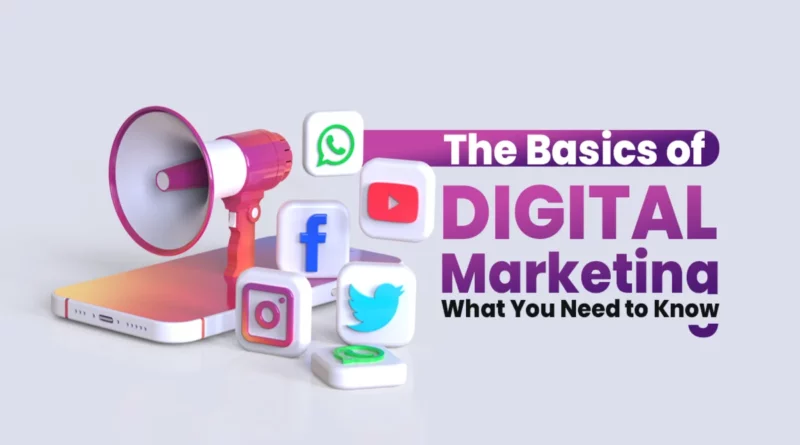The Basics of Digital Marketing: What You Need to Know
In the current corporate environment, digital marketing has become crucial. As technology develops, an increasing number of businesses are using digital marketing techniques to connect with their target market and boost sales. The sheer amount of knowledge and jargon, though, might be intimidating if you’re new to digital marketing. To assist you in getting started, we will deconstruct the fundamentals of digital marketing in this blog article. And to help you with mastering digital marketing, we recommend you enroll in one of the finest Digital Marketing Training.
Digital marketing: What is it?
All marketing initiatives that use technology or the internet to advertise a good or service fall under the digital marketing category. Reaching your target audience, increasing brand recognition, and generating revenue are the objectives of digital marketing. Search engines, social media, email, and websites are just a few channels that fall under the umbrella of digital marketing.
Why Digital Marketing?
Due to the rise in online usage among customers, digital marketing has grown in significance in today’s corporate environment. All marketing initiatives that advertise a product or service using technology or the internet are considered to fall under the digital marketing category. Digital Marketing is undoubtedly beneficial in today’s world. Therefore here is a Digital Marketing Course video to gain more insights.
It provides several benefits over conventional marketing strategies, making it a crucial part of contemporary corporate strategy.
One of its main benefits is digital marketing’s capacity to reach a larger audience than conventional marketing strategies. With over 4.7 billion internet users worldwide, digital marketing channels like search engines, social media, and email can help businesses reach a global audience. Due to the lack of regional or demographic restrictions, firms can contact millions of prospective clients.
The cost-effectiveness of digital marketing is another perk. Digital marketing is frequently less expensive than more conventional marketing strategies like print or television advertising. While many digital marketing channels, including email and social media, are free, paid advertising alternatives like pay-per-click (PPC) advertising may be more economical than conventional advertising. As a result, companies of all sizes may utilize digital marketing to reach their target market without spending a fortune.
Businesses can target specific audiences with digital marketing based on their interests, behaviors, and demographics. As a result, companies may develop marketing efforts that are more tailored to their specific markets and more likely to resonate with their target demographic. Compared to generic marketing campaigns, targeted marketing can produce higher conversion rates and a higher return on investment (ROI).
The capability of digital marketing to track and assess results in real-time is one of its distinctive qualities. Businesses may use tools like Google Analytics to measure and evaluate the efficacy of their marketing initiatives while employing digital marketing. Companies may optimize their marketing strategies and raise ROI by using data-driven decisions.
Additionally, highly adaptable and capable of being changed at the moment to respond to shifts in the market or consumer trends are digital marketing channels. Digital marketing is a crucial part of contemporary company strategy because of its adaptability and flexibility, which enables companies to swiftly change their marketing plans to stay ahead of the competition.
SEO (Search Engine Optimization)
Optimizing your website for search engines is known as search engine optimization (SEO). You may raise your brand’s exposure and generate organic traffic to your website by increasing its rating. A variety of strategies are included in SEO, such as link development, on-page optimization, and keyword research.
Finding the terms and phrases your target market uses to search on search engines is known as keyword research. You may boost your website’s relevancy and chances of ranking on SERPs by using these keywords in the content.
To raise your website’s search engine rating, you must optimize its content and page layout. For your target keywords, you should optimize your website’s meta tags, headers, and content.
Getting connections from other websites to your own includes link building. These links increase the authority and search engine rating of your website by endorsing its content.
Marketing using search engines (SEM)
SEM is the process of employing paid advertising to raise the position of your website in search engine results. SEM includes a variety of strategies, such as pay-per-click (PPC) and display advertising.
PPC marketing is purchasing ad space on search engine result pages. PPC advertising only charges you when a user clicks on your advertisement. You may manage your advertising expenses and bring relevant visitors to your website.
Ads are displayed on other websites and social media channels as display advertising. Display adverts may target specific audiences based on their interests and behaviors and come in text, picture, or video formats.
SMM: Social Media Marketing
SMM entails utilizing social media sites like Facebook, Twitter, and Instagram to connect with your target market and increase brand recognition. SMM uses a variety of strategies, such as producing and disseminating interesting content, launching social media ad campaigns, and interacting with followers.
Content Promotion
To increase brand recognition and boost sales, content marketing entails producing and disseminating useful information. Among the numerous formats that content marketing may take are blog articles, infographics, videos, and social media updates.
Email Advertising
To increase brand awareness and boost sales, email marketing entails sending promotional emails to your target demographic. Newsletters, promotional offers, and personalized emails created with your target audience’s interests and behaviors in mind are all examples of email marketing.
Design and development of websites
Your website serves as the cornerstone of your digital marketing plan. Your website’s traffic, conversion rates, and search engine ranking may increase with a well-designed and optimized website. Your website should be user-friendly on mobile devices, optimized for search engines, and mobile-friendly.
Analytics and Measuring
It’s critical to monitor and evaluate your progress if you want to improve your digital marketing approach. This involves tracking the traffic to and analytics for your website and conversion rates. By analyzing your data, you can identify areas for improvement and make data-driven decisions to optimize your digital marketing strategy.

